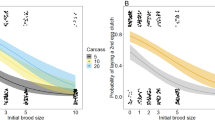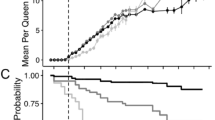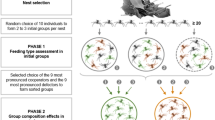Abstract
GENETIC conflicts of interest are to be expected between individuals in any non-clonal society1–5. One well studied form of conflict is that between parents and their offspring over the amount of parental care provided to the offspring3. A very different manifestation of parent–offspring conflict may occur in certain cooperatively breeding species in which parents (breeders) are assisted in the rearing of young by their grown offspring (helpers)6–8. If helpers have a sufficiently large effect on reproductive success, breeders will enhance their own inclusive fitness more by retaining their offspring as helpers than by allowing them to reproduce on their own4,5,9. We report here that older male white-fronted bee-eaters (typically fathers) actively disrupt the breeding attempts of their sons, and that such harassment frequently leads to the sons joining as helpers at the nest of the harassing father. Calculation of fitness costs and benefits to the various participants helps to clarify both why parents engage in such 'recruitment' behaviour and why sons frequently do not resist.
This is a preview of subscription content, access via your institution
Access options
Subscribe to this journal
Receive 51 print issues and online access
$199.00 per year
only $3.90 per issue
Buy this article
- Purchase on Springer Link
- Instant access to full article PDF
Prices may be subject to local taxes which are calculated during checkout
Similar content being viewed by others
References
Hamilton, W. D. J. Theor. Biol. 7, 1–52 (1964).
Alexander, R. D. A. Rev. Ecol. Syst. 5, 325–383 (1974).
Trivers, R. L. Am. Zool. 14, 249–264 (1974).
Vehrencamp, S. L. in Handbook of Behavioral Neurobiology 3: Social Behavior and Communication (eds Marler, P. & Vandenbergh, J. G.) 351–394 (Plenum, New York, 1979).
Emlen, S. T. Am. Nat. 119, 40–53 (1982).
Brown, J. L. Helping and Communal Breeding in Birds (Princeton Univ. Press, NJ, 1987).
Emlen, S. T. in Behavioural Ecology: An Evolutionary Approach (eds Krebs, J. R. & Davies, N. B.) 301–337 (Blackwell, Oxford, 1991).
Stacey, P. B. & Koenig, W. D. (eds) Cooperative Breeding in Birds: Long-Term Studies of Ecology and Behaviour (Cambridge Univ. Press, UK, 1990).
Emlen, S. T. & Vehrencamp, S. L. in Perspectives in Ornithology (eds Brush, A. H. & Clark, G. A. Jr) 93–120 (Cambridge Univ. Press, UK, 1983).
Emlen, S. T. in Cooperative Breeding in Birds: Long-Term Studies of Ecology and Behaviour (eds Stacey, P. B. & Koenig, W. D.) 489–526 (Cambridge Univ. Press, UK, 1990).
Hegner, R. E. & Emlen, S. T. Ethology 76, 189–222 (1987).
Hegner, R. E., Emlen, S. T. & Demong, N. J. Nature 298, 264–266 (1982).
Woolfenden, G. E. & Fitzpatrick, J. W. Condor 77, 1–12 (1977).
Curry, R. L. Anim. Behav. 36, 1708–1728 (1988).
Brown, J. L. & Brown, E. R. in Natural Selection and Social Behavior: Recent Research and New Theory (eds Alexander, R. D. & Tinkle, D.) 244–256 (Chiron, New York, 1981).
Vehrencamp, S. L. Anim. Behav. 31, 667–682 (1983).
Brown, J. L. Am. Zool. 14, 63–80 (1974).
Koenig, W. D. & Pitelka, F. A. in Natural Selection and Social Behavior: Recent Research and New Theory (eds Alexander, R. D. & Tinkle, D.) 261–280 (Chiron, New York, 1981).
Emlen, S. T. Amer. Nat. 119, 29–39 (1982).
Woolfenden, G. E. & Fitzpatrick, J. W. The Florida Scrub Jay: Demography of a Cooperative Breeding Bird (Princeton Univ. Press. NJ, 1984).
Emlen, S. T. & Wrege, P. H. J. Anim. Ecol. 60, 309–326 (1991).
Emlen, S. T. & Wrege, P. H. Behavl Ecol. Sociobiol. 25, 303–319 (1989).
Mumme, R. L., Koenig, W. D. & Ratniecks, F. L. W. Anim. Behav. 38, 331–343 (1989).
Author information
Authors and Affiliations
Rights and permissions
About this article
Cite this article
Emlen, S., Wrege, P. Parent–offspring conflict and the recruitment of helpers among bee-eaters. Nature 356, 331–333 (1992). https://doi.org/10.1038/356331a0
Received:
Accepted:
Issue Date:
DOI: https://doi.org/10.1038/356331a0
This article is cited by
-
Sex and individual differences in cooperative nest construction of sociable weavers Philetairus socius
Journal of Ornithology (2014)
-
The Altruism Paradox: A Consequence of Mistaken Genetic Modeling
Biological Theory (2013)
-
Cooperation and Hamilton's rule in a simple synthetic microbial system
Molecular Systems Biology (2010)
-
Evolutionary theory of parent–offspring conflict
Nature (1995)
-
Mating system of the cooperatively breeding noisy miner Manorina melanocephala, as revealed by DNA profiling
Behavioral Ecology and Sociobiology (1995)
Comments
By submitting a comment you agree to abide by our Terms and Community Guidelines. If you find something abusive or that does not comply with our terms or guidelines please flag it as inappropriate.



